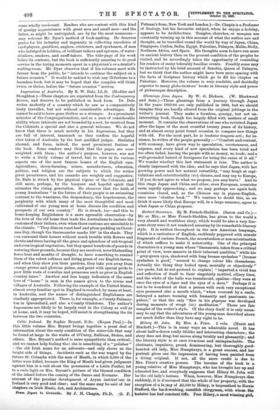in the years 1883-84 are only published in 1889, but
we should imagine they are hardly altered from the original jottings in the writer's journal. They make a formless, gossipy, but not un- interesting book, though too largely filled with matters of small moment. It contains the observations of one who revisited Japan after the lapse of the most eventful twenty years of its history, and at almost every point found occasion to compare new things with old. For the most part, he is taudator temporis acti ; for in- stance, he writes of the people generally :—" Comfort and content, with economy, have given way to speculation, covetousness, and expense, and every kind of new speculation has been tried and too often failed, leaving the people with no money, no trade, and a well-grounded hatred of foreigners for being the cause of it all." We wonder whether this last statement is true. The author is clearly impressed with the idea; and he says that Japan, with her growing power and her natural versatility, "may laugh at capi- tulations and exterritoriality (sic) clauses, and may say to Europe, If you do not agree to what we propose, you may leave.' And to this stage Japan and China and other, even European, countries seem rapidly approaching ; and we may perhaps see again both countries closed, and, as the Chinese say in pigeon-English, once more shuttee book.' " We venture to doubt this, as we think it more likely that Europe will, in a large measure, agree to what Japan or China proposes.


















































 Previous page
Previous page